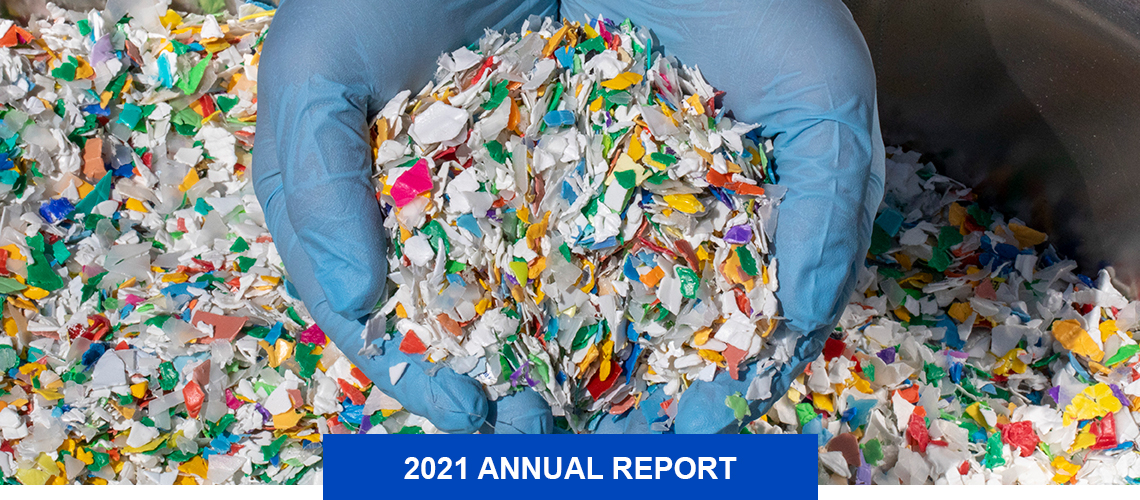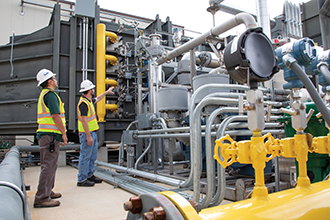
About the Header
SwRI is working with clients to develop commercially viable techniques to recycle plastics, particularly mixed plastics, the variety of items found in a typical recycle bin.
In 2021, SwRI saw an increased focus on transitioning to clean energy technologies, including the supercritical carbon dioxide power cycle technology we are developing and demonstrating at a pilot plant on our grounds. Comprehensive environmental services complement our work in the energy field.
ENERGY
In 2021, we hosted the Thermal-Mechanical-Chemical Energy Storage (TMCES) workshop, bringing together industry and government representatives to address the need for long-duration energy storage to enable renewable energy integration and industrial decarbonization. SwRI is also demonstrating a scaled Pumped Heat Energy Storage (PHES) facility that will verify system operation and controls concepts for the emerging technology.
Worldwide natural gas production has steadily increased with population growth and demands for lower emission energy sources. When natural gas is extracted from reservoirs, liquids often enter pipelines as well, so it is critical to ensure that only the gas is ultimately delivered to compression equipment and industrial processes. To better characterize equipment exposed to liquid in the process, SwRI engineers designed and fabricated an addition to our Metering Research Facility. Using this wet gas flow loop, engineers can characterize separation equipment, gas sampling techniques and flow measurement technology with liquid present in high-pressure natural gas flows.
Since 1987, SwRI has operated the Center for Nuclear Waste Regulatory Analyses (CNWRA®) to assist the Nuclear Regulatory Commission (NRC) with responsibilities associated with radioactive waste storage, transportation, disposal and related areas. This year, a CNWRA scientist participated in the Senior Seismic Hazard Analysis Committees (SSHACs) evaluating hazards at the Idaho National Laboratory and Pantex, two Department of Energy (DOE) sites involved in nuclear research and security and not regulated by NRC. Previously, CNWRA staff assisted NRC in writing the SSHAC guidance for the process that shapes how hazard evaluations such as these are conducted in the U.S. and around the world. In addition, CNWRA staff worked with NRC to develop guidance related to volcanic hazard assessments. Other teams supported NRC to complete Environmental Impact Statements for proposed centralized interim storage facilities for high-level nuclear waste in West Texas and New Mexico and to assess a complex uranium production site in Church Rock, New Mexico.
With one of the world’s largest organizations dedicated to fire technology, SwRI offers a range of services, including testing to industry standards, listing and labeling products, and developing new test protocols. In 2021, we evaluated the fire performance of nuclear waste containers using a new protocol to simultaneously test multiple containers more cost-effectively.
SwRI has launched a new Joint Industry Program (JIP) to investigate energy storage systems for the grid. JIP efforts will include developing new test cycles for batteries employed in grid applications, estimating the life span of batteries and their potential for failure while reducing the likelihood of battery fires. The new program will investigate how responses to different demand scenarios affect the degradation of a battery.
SwRI provides exploration and production support to oil and gas companies, using a range of structural geology and geomechanics techniques. Staff members analyzed rock cores from the Uinta Basin in Utah and the Eagle Ford Formation in South Texas to characterize the natural deformation that influenced the evolution of unconventional reservoirs in these basins, ultimately to optimize hydrocarbon production.

In 2021, SwRI realized two key milestones in advanced supercritical carbon dioxide (sCO2) power cycles, installing a high-temperature, integrally geared compander and key process hardware at the 10 MWe Supercritical Transformational Electric Power (STEP) pilot plant.

A multidisciplinary team of scientists conducted a comprehensive statistical evaluation of the DOE’s High Efficiency Particulate Air (HEPA) Filter Test Facility, informing potential alternatives to the current 100% sampling protocol required for filters installed in certain safety confinement systems at DOE nuclear facilities.

SwRI geologists studied the offshore Orphan Basin, Flemish Pass and Flemish Cap region near Newfoundland to provide insights into the structural evolution of this frontier oil and gas province.
ENVIRONMENT
SwRI engineers and scientists develop and validate novel processes to produce fuels and other high-value products from unconventional sources, using custom catalysts, pilot plants and laboratory facilities, including using pyrolysis for processing mixed plastic waste.
Water quality and availability remain important global and local concerns, particularly in association with climate change. SwRI is characterizing aquifer recharge-discharge relationships in West Texas and analyzing transboundary water resources along the U.S.-Mexico border. These studies, along with our ongoing water budget investigations, are essential for protecting and managing critical groundwater aquifer resources threatened by development, industrialization and climate change.